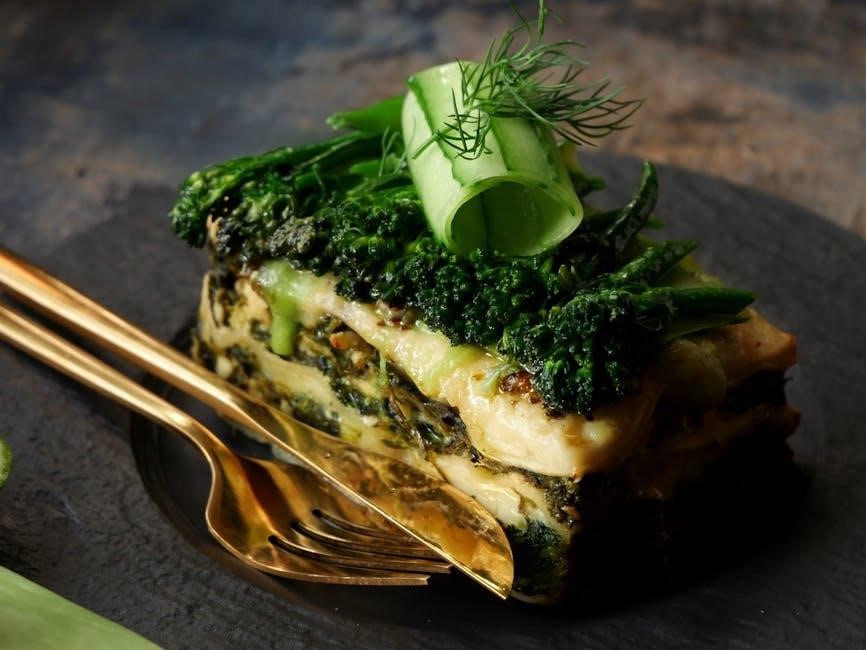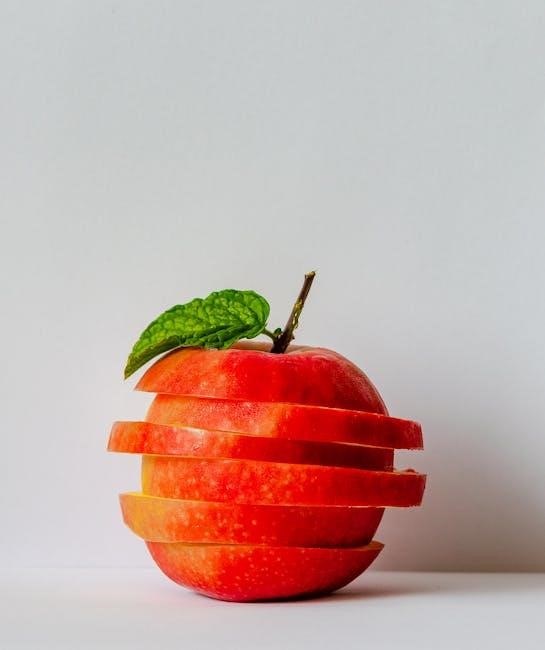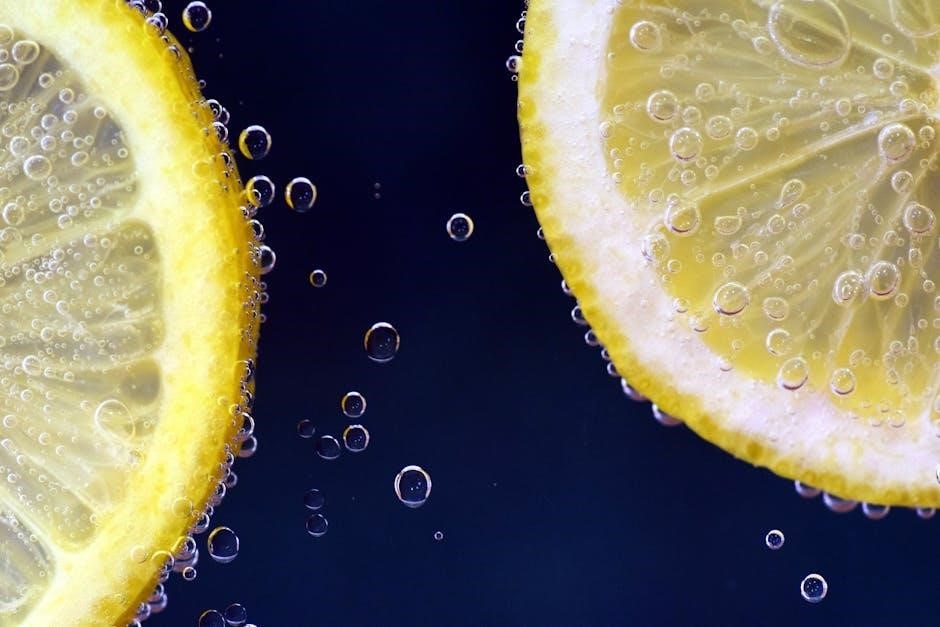A concussion diet focuses on nutrition to support brain recovery, reducing inflammation, and enhancing cognitive function․ It emphasizes foods rich in antioxidants, omega-3s, and essential nutrients to promote healing․
1․1 What is a Concussion?
A concussion is a type of mild traumatic brain injury (mTBI) caused by a blow or jolt to the head, disrupting normal brain function․ It occurs when the brain moves violently inside the skull, often due to a direct hit, fall, or sudden stop․ Concussions can result in temporary cognitive, physical, and emotional symptoms, such as headaches, dizziness, confusion, sensitivity to light, and memory issues․ While most concussions are mild, some individuals may experience prolonged symptoms, known as post-concussion syndrome․ Rest and avoiding strenuous activities are crucial during recovery to prevent worsening symptoms and allow the brain to heal․ Understanding the nature of concussions is essential for implementing appropriate care and dietary strategies to support recovery․
1․2 Importance of Nutrition in Recovery
Nutrition plays a critical role in concussion recovery by providing the brain with essential nutrients to heal and function properly․ After a concussion, the brain requires increased energy to recover, and a well-balanced diet helps meet this demand․ Key nutrients such as vitamins, minerals, and antioxidants support brain health, reduce inflammation, and promote cellular repair․ A concussion diet focuses on replenishing depleted micronutrients like vitamins C, D, E, magnesium, and zinc, which are vital for cognitive function and recovery․ By fueling the brain with the right foods, individuals can enhance their recovery process, alleviate symptoms, and restore overall brain health more effectively․ A tailored nutrition plan is a foundational step in managing post-concussion symptoms and supporting long-term recovery․
Key Nutrients for Concussion Recovery
Vitamins (C, D, E), minerals (magnesium, zinc), antioxidants, and omega-3 fatty acids are crucial for brain health, reducing inflammation, and supporting recovery after a concussion․
2․1 Macronutrients: Carbohydrates, Proteins, and Fats
Carbohydrates provide energy for brain function, while proteins support tissue repair and neurotransmitter production․ Healthy fats, like omega-3s, reduce inflammation and promote neural health․ Balancing these macronutrients aids recovery․
2․2 Micronutrients: Vitamins and Minerals

Essential vitamins and minerals play a critical role in concussion recovery․ Vitamin C supports neurotransmitter production and reduces oxidative stress, while Vitamin D aids in mood regulation and brain function․ Vitamin E acts as a powerful antioxidant, protecting brain cells from damage․ Minerals like magnesium and zinc are vital for nerve function, energy production, and tissue repair․ These micronutrients often become depleted after a concussion, making their replenishment crucial for optimal healing․ Incorporating foods rich in these nutrients helps restore balance and supports the brain’s recovery process․
2․3 Antioxidants for Brain Health
Antioxidants are vital for reducing oxidative stress, a common consequence of concussions․ Foods rich in antioxidants, such as blueberries and cranberries, help combat oxidative damage and promote brain healing․ These berries contain powerful compounds like anthocyanins, which support cognitive recovery and improve communication between brain cells․ Leafy greens, nuts, and seeds are also excellent sources of antioxidants like vitamin C and vitamin E, which protect brain cells from further damage․ Incorporating antioxidant-rich foods into your diet can aid in reducing inflammation and enhancing recovery after a concussion․ By focusing on these nutrients, you can provide your brain with the necessary tools to heal and regain optimal function․

Foods to Include in Concussion Diet

Incorporate anti-inflammatory and nutrient-rich foods like leafy greens, berries, and omega-3 sources to support brain healing and reduce inflammation, promoting overall recovery and cognitive function․
3․1 Anti-inflammatory Foods
Anti-inflammatory foods play a crucial role in concussion recovery by reducing inflammation and oxidative stress․ Incorporate foods like berries (blueberries, strawberries), which are rich in antioxidants, and leafy greens (spinach, kale) packed with vitamins and minerals․ Nuts and seeds, such as walnuts and flaxseeds, provide omega-3 fatty acids that support brain health․ Fatty fish like salmon and mackerel are excellent sources of EPA and DHA, which reduce inflammation and promote neural repair․ Additionally, include herbs and spices like turmeric and ginger, known for their anti-inflammatory properties․ These foods help create an environment conducive to healing and can alleviate symptoms like headaches and fatigue, supporting overall brain recovery․
3․2 Omega-3 Rich Foods
Omega-3 fatty acids are essential for brain health and concussion recovery․ They reduce inflammation and support cognitive function․ Include fatty fish like salmon and mackerel, which are rich in EPA and DHA․ Walnuts, flaxseeds, and chia seeds are plant-based sources of ALA, a precursor to omega-3s․ These foods help repair brain cells, improve communication between neurons, and alleviate symptoms like memory issues and focus problems․ Omega-3s also promote blood flow to the brain, aiding in faster recovery․ Incorporating these foods into your diet can significantly support the healing process after a concussion and enhance overall brain function․
3․3 Complex Carbohydrates
Complex carbohydrates are vital for providing steady energy to the brain during concussion recovery․ Foods like whole grains, vegetables, and legumes are rich in fiber, vitamins, and minerals that support brain health․ They help maintain stable blood sugar levels, preventing energy crashes and promoting focus․ Incorporating complex carbs such as oats, quinoa, and sweet potatoes into meals aids in the healing process by supplying essential nutrients for brain function and repair․ These foods also contain antioxidants and anti-inflammatory properties, further supporting recovery․ Balancing complex carbs with other nutrients ensures a steady supply of energy, which is crucial for cognitive healing after a concussion․
3․4 Lean Protein Sources
Lean protein sources are essential for concussion recovery, as they support brain repair and neurotransmitter function․ Foods like omega-3 enriched eggs, chicken, turkey, and fatty fish (such as cod and salmon) provide high-quality protein without excess saturated fats․ These proteins aid in rebuilding brain cells and promoting cognitive function․ Plant-based options like beans, lentils, and edamame are also excellent choices, offering additional fiber and antioxidants․ Lean proteins help stabilize blood sugar levels, providing sustained energy for the brain during healing․ Incorporating these foods into meals ensures a steady supply of amino acids, which are crucial for neurotransmitter production and overall brain health, supporting a faster and more effective recovery from a concussion․

Foods and Habits to Avoid
Avoid processed foods, sugary snacks, caffeine, and alcohol, as they can worsen inflammation and hinder recovery․ Stay hydrated to support optimal brain function and healing․
4․1 Processed Foods and Sugars
Processed foods and high-sugar snacks can exacerbate inflammation and hinder recovery after a concussion․ These foods often lack essential nutrients and can cause energy fluctuations, worsening symptoms like fatigue and fogginess․ Refined sugars, found in sodas and candies, promote inflammation in the brain, slowing healing․ Opting for whole, nutrient-dense foods instead helps maintain stable blood sugar levels and supports brain health․ Avoiding these harmful food choices is crucial for an effective concussion recovery plan․
4․2 Caffeine and Alcohol
Caffeine and alcohol can negatively impact concussion recovery by altering brain function and hydration levels․ Caffeine, while sometimes used to boost alertness, can dehydrate the body and increase heart rate, potentially worsening symptoms like headaches and fatigue․ Alcohol, a neurotoxin, can slow healing, impair cognitive recovery, and exacerbate symptoms such as dizziness and confusion․ Both substances can interfere with the brain’s ability to heal and regain balance․ It is recommended to avoid or significantly limit their consumption during the recovery period to support optimal healing and reduce the risk of prolonged symptoms․
4․3 Dehydration Risks
Dehydration can exacerbate concussion symptoms, such as headaches, fatigue, and dizziness, by reducing blood volume and impairing brain function․ Even mild dehydration can slow cognitive recovery and prolong healing․ After a concussion, the brain requires adequate hydration to maintain proper function and repair damaged cells․ Drinking plenty of water and consuming water-rich foods, such as fruits and vegetables, is essential․ Clear broths and electrolyte-rich beverages can also help replenish lost salts and maintain hydration levels․ Avoiding excessive consumption of diuretics, like caffeine and alcohol, is crucial to prevent further fluid loss․ Proper hydration supports overall recovery and helps minimize the duration of post-concussion symptoms․ Consulting a healthcare provider for personalized advice on hydration is highly recommended․
